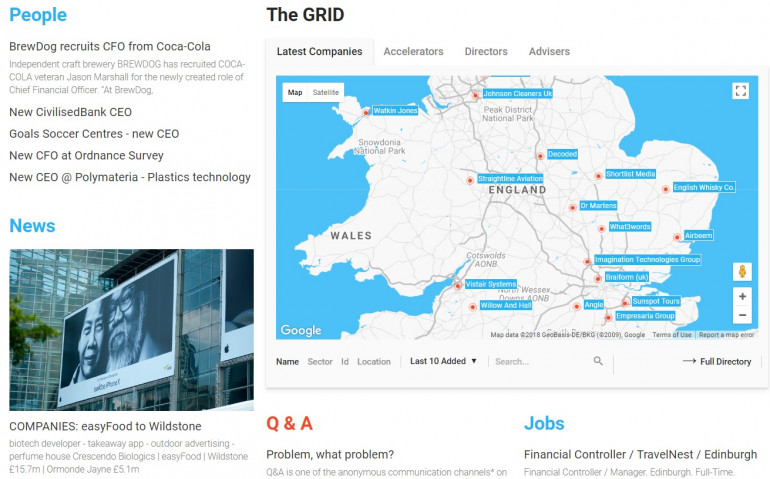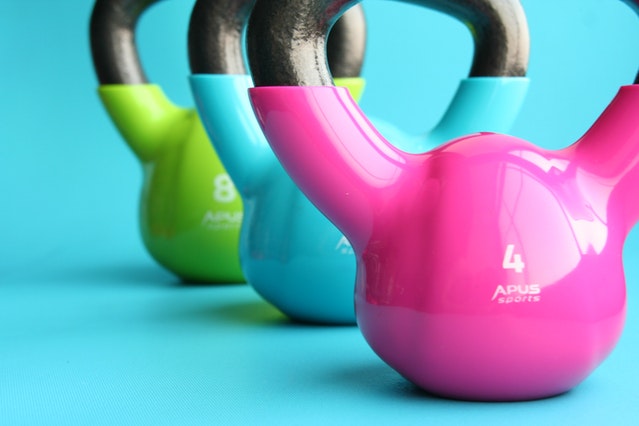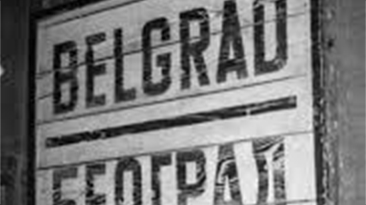Published by Directorzone Markets Ltd on October 30, 2017, 9:00 am in News, Other
Thursday February 14th 2019
EndsThursday February 14th 2019

Online cycle gear - Concierge service - Cosmetics - Offshore energy equipment - Trading app - Online estate agent - Craft beer London - Boot maker - Musical instruments - Visual merchandising
Wiggle £283m | Ten Group £36.2m | Beauty Pie | Osbit £15.5m | Bux | Nested | Hiver | Dr Martens £290.6m | Roli | Attraqt £3.6m
News about 10 UK growth companies and/or accelerators + turnover in the GRID marketplace 22nd -28th October 2017:
WIGGLE: online cycle gear - Portsmouth
WiggleCRC steers towards £100m takeover of German rival Bike24 | Daniel Dunkley, The Sunday Times. October 22. Wiggle Ltd / Wikipedia
DZ profile: Wiggle Limited
Business: online retailer of cycle, run, swim and outdoor equipment and apparel
Launched: 1999
Location: Portsmouth
Founder: Mitch Dall bought a local bike shop called Butlers Cycles, in Portsmouth, in 1995. Wiggle started officially trading on 28th May 1999, with an initial investment of £2000 from Mitch Dall and Harvey Jones.
Staff: led by former White Company chief executive Will Kernan
Financials: enjoyed sales of £283m last year, and made underlying earnings of about £7m. The Bike24 deal is likely to add revenues of more than €85m.
Investment: In 2009, Mitch Dall sold his 26 percent stake in the company to investment firm ISIS. Was acquired by private equity firm BRIDGEPOINT CAPITAL for £180m in December 2011.
News:
1. Is in advanced talks to buy the German business rival BIKE24…and is understood to be paying more than £100m. The takeover sees expand its footprint into mainland Europe. Bike24 draws most of its revenue from Germany, Austria and Switzerland.
2. Wiggle bought CHAIN REACTION CYCLES, another rival based in Northern Ireland, in 2016 combining the two largest companies in the UK online cycle retail market. The company renamed itself WiggleCRC, but Wiggle remains a separate brand and website from Chain Reaction Cycles, despite the two companies being integrated in terms of stock holding and finances.
3. Wiggle has been tipped for sale or a stock market float for several years, following its buyout by Bridgepoint in 2011. Bridgepoint hired Rothschild three years ago to explore a potential exit, yet decided to hold on to the business and expand through deals.
TEN GROUP: concierge service - London
Ten Group plots float | Peter Evans, The Sunday Times. October 22
DZ profile: Ten Lifestyle Management Limited (Ten Group)
Business: concierge service that promises members access to sold-out theatre shows and tables at top restaurants. Ten Group said it had more than 60m members through a subscription service for high rollers and a database of corporate members. It counts the bank Coutts and carmaker Maserati among its clients. Ten competes with companies such as Quintessentially Group.
Launched: 1998
Location: London HQ, Las Vegas, San Francisco, New York, Miami, Hong Kong, Singapore, Melbourne, Mexico City, Shanghai, Tokyo, Cape Town, Brussels, São Paulo, Dubai, Mumbai, Toronto, Zürich.
Founder: Alex Cheatle, 47
Staff: “Nearly two-thirds of Ten’s 545-strong team is based outside of the UK, with a single operating platform. Our Product team includes 89 dedicated technologists, including Developers as well as UX, UI, and QA specialists.”
Financials: Last year, Ten made a pretax loss of £2.1m on a turnover of £36.2m.
News: plans to announce its intention to float on AIM, raising between £30m and £40m. It will use the cash to invest in technology and for overseas expansion.
BEAUTY PIE: Cosmetics - London
Start-ups are in my make-up | Laura Onita, The Sunday Times. October 22.
DZ profile: Beauty Pie Limited
Business: offering everything from luxury make-up and skincare to nail products at knock-down prices. She claims the lipstick she sells for £2.29 is the same as one that costs £20-plus if it is stamped with a fancy brand and sold over a department store’s beauty counter. It’s from the same factory, she says, just priced without the mark-up that underpins the £330bn a year global cosmetics industry. Products are made in Italy, Germany, France, Switzerland, Spain, America, Korea and Japan.
Launched: 2015
Location: Fulham, southwest London
Founder: Marcia Kilgore, 49, has amassed a fortune running to tens of millions of pounds, selling two big businesses (Bliss spas - sold in 1999 to luxury goods group LVMH for a rumoured £25m - and the Soap & Glory beauty products line, swallowed up by Walgreens Boots Alliance for £50m in 2014) and gaining international fame as the creator of the FitFlop orthopaedic sandal.
News:
1. Marcia Kilgore still owns SOAPER DUPER, a smaller range of bodycare products made from natural ingredients. FitFlop, the footwear brand designed to help wearers exercise their lower body muscles with each step, is arguably her most successful venture: FitFlop raked in $136m (£104m) in sales and a $9.1m pre-tax profit last year, paying out $12.2m in dividends.
2. She knows, however, that one of the biggest hurdles is to get women to understand how little a part of the cost of a luxury product is actually “the product”. At Beauty Pie, they say 90% of the cost is LMAO (landfill, marketing and overheads) — a pun on the internet shorthand for “laughing my ass off”.
OSBIT: offshore energy equipment - Northumberland
Start-ups freed me from the ivory towers | Peter Evans, The Sunday Times. October 22
DZ profile: Osbit Limited
Business: designs equipment for offshore energy companies.
Launched: 2010
Location: Riding Mill, Northumberland
Founder: Tony Trapp, 72. At Newcastle University, he helped to pioneer research into underwater earthmoving technology, a technique that was pivotal in the development of the North Sea oil industry. Using his expertise in submerged engineering, Trapp has co-founded two multimillion-pound businesses in northeast England — and is now on his third.
Staff: 60
Financials: In the past year, it has turned over £15.5m and made a profit of £1.8m.
Investment: initial funding of £1m. He fronted most of the cash himself following the sale of his previous venture, the Engineering Business (EB), to Dutch shipbuilder IHC Merwede.
News:
1. His first company, Soil Machine Dynamics, was set up with colleagues from Newcastle University. It is still based in northeast England, although it was sold to the Chinese government two years ago for £120m.
2. In the late 1990s, he worked on engineering projects for technology companies that laid fibre optic cables on the ocean floor. Then the dotcom bubble burst. Trapp sold EB in 2008. He remained in the business for another two years. The £26m deal saw the company’s 70 members of staff receive 20% of the proceeds — an average of £75,000 each. A similar ownership structure is in place at Osbit.
3. Trapp has recruited about half of Osbit’s staff from his previous companies, with many of the remainder made up of engineering graduates. “We run engineering businesses for engineers,” Trapp said.
BUX: Trading app - London
Trading app Bux launches Seedrs round to create a “millennial financial brand” complete with cryptocurrency app | Lucy White, City A.M. October 23
DZ profile: Ayondo Markets Limited (BUX)
Business: a trading app designed for the younger generation. Bux operates a model where users can trade "contracts for difference" (CFDs). They mirror the price of the asset underlying them, for example a stock, but the owner of the CFD never actually owns the stock. Bux operates across eight European countries, and has partnered with broker Ayondo Markets in the UK to obtain licensing from the Financial Conduct Authority. The app has 200,000 users in the UK, who can start using virtual money and then progress to real money. Currently 85,000 users have a real-money account.
Launched: 1996
Location: London
Founder: Nick Bortot
Investment: institutional investors, who include Germany’s HOLTZBRINCK VENTURES and the Netherlands' VELOCITY CAPITAL and angel investors Arthur Kosten (formerly of Booking.com) and Binckbank founder Thierry Schaap.
News:
1. Bux has today launched a crowdfunding round on Seedrs after completing a €10.6m (£8m) series C round from institutional investors. Crowdfunders who join the Seedrs round will be able to invest on exactly the same terms.
2. The company, which aims to be a “millennial financial brand”, wants to expand its current trading community while also launching a stock trading app and a cryptocurrency trading app next year. Bortot: “We’re targeting young people who often don’t have the means to invest a couple of thousands of pounds or euros. The want to invest £50, or £100.”
NESTED: Online estate agent - London
Online estate agent Nested nets £36m from venture capitalists | Russell Lynch, The Evening Standard. October 23.
DZ profile: Nextday Property Ltd (Nested)
Business: online estate agent. Nested guarantees sellers up to 97% of the value of their property in 90 days and the rest on completion of the sale, allowing customers to get on with buying their next home and removing the risk of collapsed property chains. Nested charges an average 3% of the property’s value if it achieves its sale valuation, and takes the loss if the house is sold for below its guaranteed minimum – typically 95% to 97% of the valuation. It is taking on 50 sellers a month.
Launched: 2015
Location: London
Founder: Matt Robinson, the GoCardless founder
Investment: early backers include London’s venture capital queen Eileen Burbidge’s PASSION CAPITAL. Has received £36m funding from GLOBAL FOUNDERS CAPITAL, bringing the total raised to £47m.
HIVER: Craft beer - London
Hiver beers founder Hannah Rhodes is turning bees to money | Elliott Haworth, City A.M. October 23
DZ profile: Hiver Beers Ltd
Business: Craft beer business producing between 10,000 to 15,000 litres per month. Sells beer to some of the biggest names on the high street, from Marks and Spencer, to Selfridges and Harvey Nichols.
Launched: 2013
Location: Bermondsey, London.
Founder: Hannah Rhodes. Following a decade in the drinks industry, including a spell at Meantime Brewery, she set up her firm selling honey-brewed beer three years ago.
Investment: Earlier this year the firm started a CROWDCUBE campaign to raise £350,000, but cancelled it after smashing the halfway mark. “It was fantastic, and we’re so grateful, but we didn’t feel that we were reaching out to more serious investors through it.” Rhodes says that they are working on honouring all of the pledges made, but that the decision to step back from the crowdfunding campaign was prompted by an “exciting conversation we’re having with a future partner”.
News:
1. Rather than adding the honey at the end of the process as a sweetener, it is added at the beginning, whereby it the sugar in the honey is converted into alcohol, giving it a depth of flavour with a dry finish.
2. Rhodes’ interest in sustainability and urban beekeeping is at the heart of everything the firm does. Even her biodegradable business card is laced with seeds. Hiver is expecting to be profitable this year, and when it is, 10 per cent of its profits will go to bee charities. But there’s more: “All our raw honey is sourced from independent British beekeepers. We sponsor beehives as part of a community project, we organise planting days, working with local beekeeping associations.”
DR MARTENS: boot maker - Northamptonshire
Dr Martens on firm footing as sales soar 25% | Laura Onita, The Evening Standard. October 23.
DZ profile: Dr Martens Limited
Business: iconic boot maker
Launched: 1960
Location: Wellingborough, Northamptonshire
Founder: Dr Klaus Märtens developed the air-cushioned sole that would form the basis of the Dr Martens boot in postwar Munich. The Griggs family, shoemakers from Northamptonshire, saw an ad for the air-cushioned sole in 1960 and bought a licence to use it in work boots.
Financials: Revenues rose 25% to £290.6m in the year ending in March, while underlying profits rose 27% to £37.5m.
Investment: bought in 2013 for £300 million by the investment firm PERMIRA, which has been behind brands including Hugo Boss.
News:
1. Fashion-forward customers are also flocking online to buy its popular boots, such as the 1460 Black Smooth. E-commerce rose 54% to £32.4 million, boosted by shoppers in Asia, which now accounts for almost a quarter of the brand’s revenues. America “continues to be tough”, although sales were still up by 13%.
2. The company has expanded significantly, opening 18 new stores this year alone. It launched a swanky new flagship store and European head office in Camden.
3. The retailer’s chief executive Steve Murray, who is widely credited for the rude health of the business, stepped down earlier this month after three years at the helm.
UPDATE:
Buyout boys want to fill their boots | Sam Chambers, The Sunday Times. 20 January 2019
4. hired Kenny Wilson, 52, chief executive to lead an international expansion drive. In 1990, Wilson joined LEVI’S, where he remained for almost 20 years, working in everything from retail to product development to marketing. After a spell running the jeans business in Europe, the Middle East and Africa, he left to guide the expansion of CLAIRE’S ACCESSORIES, backed by US private equity house APOLLO GLOBAL MANAGEMENT. A seven-year stint at Cath Kidston followed, in which he steered the maker of floral-print homeware to a buyout by BARING PRIVATE EQUITY.
5. sales grew 20% to £349m last year, despite the drab retail climate, while underlying profits jumped by a third to £50m.
6. about 55% of Dr Martens’ customers are female.
7. the brand fell out of fashion and narrowly avoided going bust in 2003 after being slow to outsource production to the Far East. The business was nursed back to health over a decade by fashion industry veteran David Suddens before its sale to Permira. Permira is aiming to grow sales close to £1bn. Dr Martens has 106 shops of its own, up from 45 when Permira took over.
ROLI: musical instruments - London
Pharrell Williams takes stake in British startup Roli and becomes creative chief | Lynsey Barber, City A.M October 26
DZ profile: Roli Ltd.
Business: British startup which wants to reinvent musical instruments behind two new instruments - Seaboard and Roli Blocks.
Launched: 2009
Location: London
Founder: Roland Lamb
Investment: has raised just over £30m from top venture capital investors, including BALDERTON and INDEX VENTURES
News:
1. Has named the producer and singer known for the song "Happy" as its creative chief and Williams will take a stake in the business too. The value of the investment has not been disclosed but the company described him as "co-owner" and said he will be involved in helping invent new devices. Williams has put his name to a Roli studio pack - that is, bringing voice, beats and basslines from hit song Happy that can be downloaded through Roli's Noise app.
2. The startup was named one of Tech City UK's Future Fifty this year.
ATTRAQT: online visual merchandising - London
Dan Wagner's old firm ATTRAQT has suffered a share value slide after the new CFO found accounting 'inaccuracies' | City A.M. October 27. This article originally appeared on Business Insider UK.
DZ profile: Attraqt Group Plc
Business: provides software to help businesses build online shops. It works with the likes of TESCO's F&F; clothing brand, SUPERDRY, TK MAXX and PAPERCHASE.
Launched: 2003
Location: London & Chicago
Founder: co-founder Dan Wagner, serial tech entrepreneur. Wagner, whose other business Powa Technologies imploded spectacularly last year, quit as chairman of ATTRAQT last June.
Financials: to 31-Dec-16 - Revenue £3.6m; Pre-Tax -£1.9m
Investment: listed on AIM in 2014
News: Shares lost a quarter of their value on Friday after Eric Dodd, CFO since September, discovered "inaccuracies in forecasting the timing of certain contracts and client "go-live" dates" following a review commissioned by the board. Revenue is being delayed by "a number of significant new contracts closing but later than planned, and some other contract decisions being delayed." As a result, the loss-making company warned revenues for the year will now be roughly 10% lower than initially forecast.








